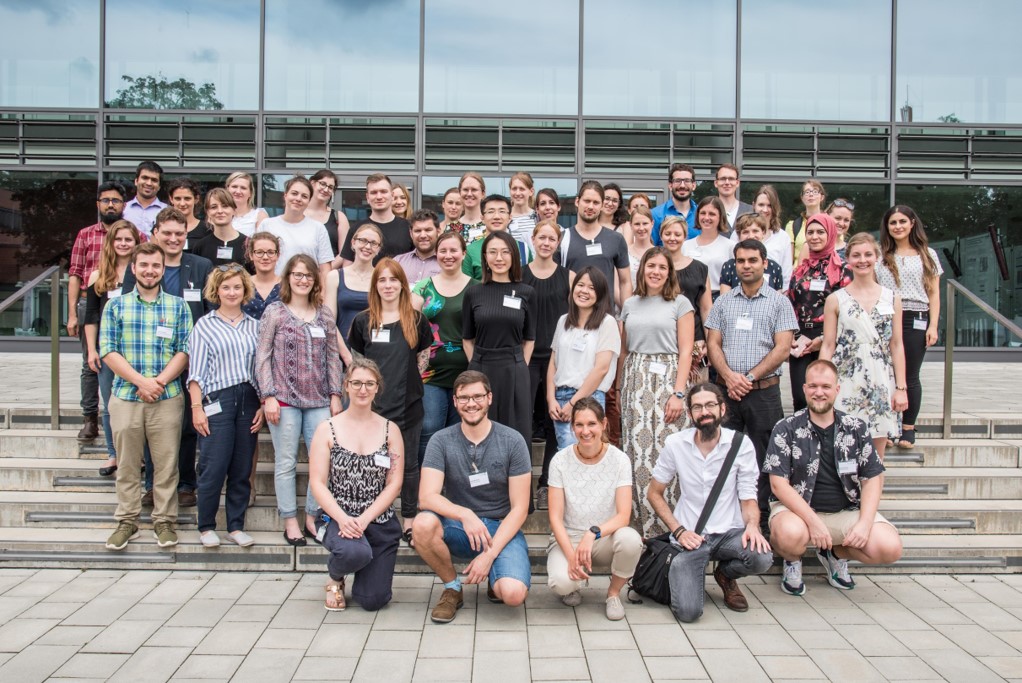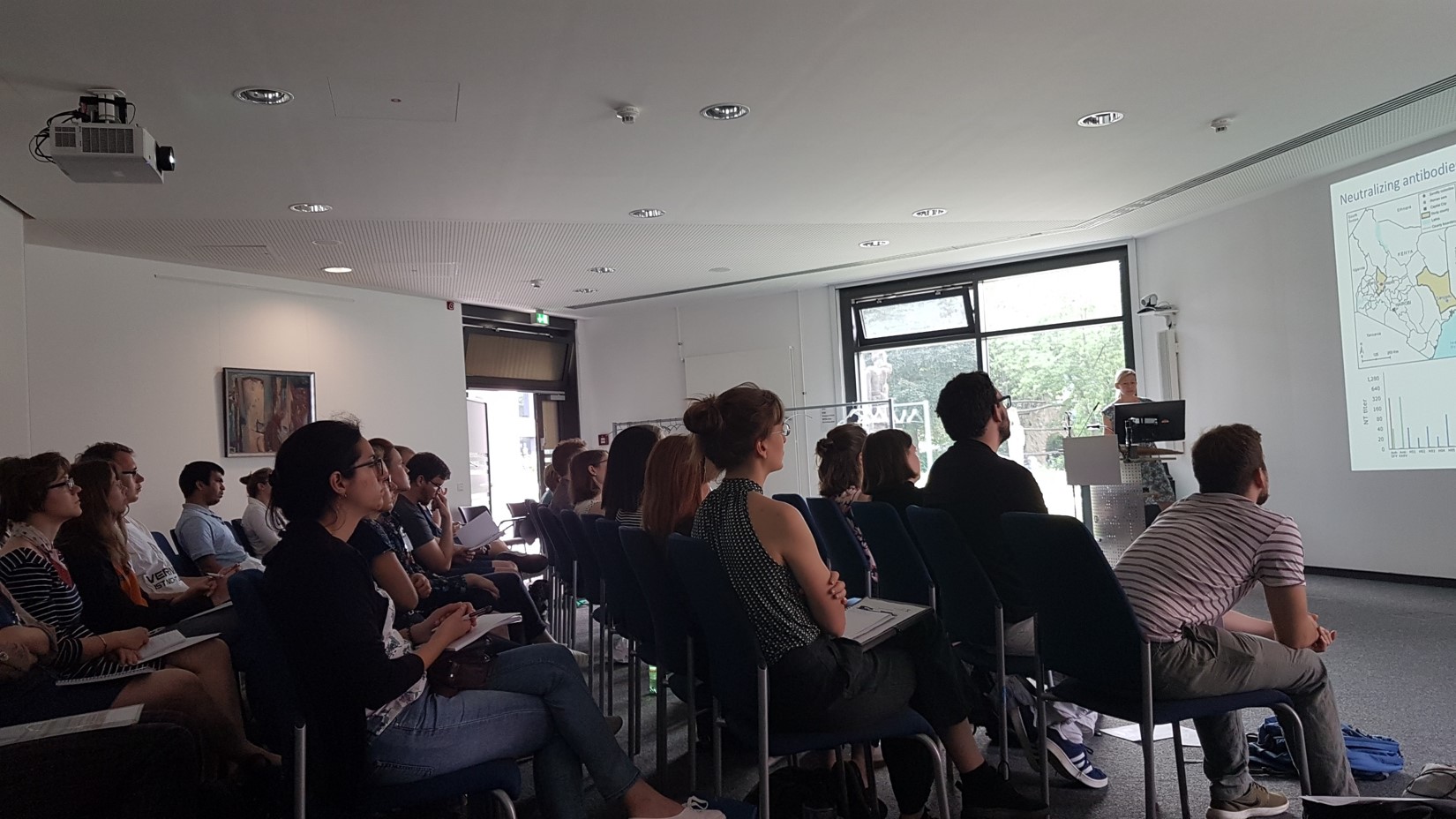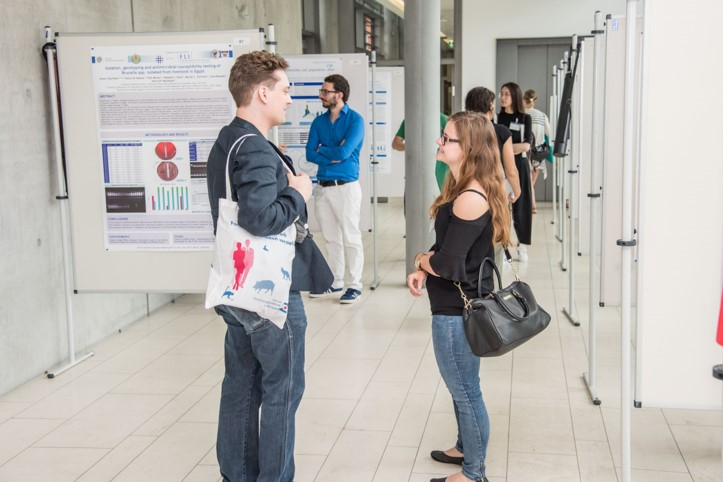The Junior Scientist Zoonoses Meeting (JSZM) is an annual event hosted by the German Research Platform for Zoonoses to promote its doctoral students and early stage postdocs. In 2019, the JSZM took place at the Robert Koch-Institute in Berlin from June 20th until June 22nd. Forty-nine junior scientist of the Zoonoses Platform from different disciplines attended the meeting.
Supporting junior scientists is an important goal of the German Research Platform for Zoonoses. For this reason, the office on the island of Riems, Greifswald, organizes the annual JSZM at changing renowned research institutions in Germany. This year, the meeting was realized with the kind support of the Robert Koch-Institute (RKI) at one of its research locations in Berlin.

participants at the JSZM 2019 in Berlin (photo: Andrea Schnartendorff)
The meeting was attended by 49 junior scientists, who started the meeting on the first day with a guided tour at the historic institute section and the RKI museum. After a brief excursion into the history of infection research in Germany and the beginnings of the "One Health" idea, the participants had the opportunity to present their own current research work in small moderated Round Table Discussions (RTDs).
Even though the cold beverage supply on the first day could not quite keep up with the summer temperatures in Berlin, many lively scientific discussions took place. Dr. Susanne Möhring (Forschungszentrum Jülich GmbH) supplemented the program on the first day with a lecture providing a brief overview of federal funding opportunities in Germany.
The second and third days of the meeting were marked by speeches from guest speakers, providing insights into their diverse personal career pathways, their current research, giving career advices, or presenting funding opportunities/ career options.
 participants at the JSZM 2019 listening to the talk of Dr. Sandra Junglen (photo: Andrea Schnartendorff)
participants at the JSZM 2019 listening to the talk of Dr. Sandra Junglen (photo: Andrea Schnartendorff)
While Dr. Annisa Chand gave an insight into the publication possibilities at Nature and her work as an editor, Dr. Sandra Junglen (Charité Berlin) and Prof. Ilse Jacobsen (HKI/ FSU Jena) reported from their research work. Personal insights into a scientific career were granted by Prof. Stefanie Becker (TiHo Hannover), Dr. Imke Steffen (TiHo Hannover), Dr. Anton Aebischer (RKI) and Dr. Victor Corman (Charité Berlin), with plenty of good tips for the participants. Especially as Dr. Aebischer clarified that one decision, which, from a retrospective point of view, might have been suboptimal in terms of career development, will not necessarily lead to dissatisfaction, both privately and professionally.
The fact that the career of a managing director of a transnational research institute also started as a doctoral student was a motivational fact gained from the lecture of Prof. Ullrich Kalinke (TWINCORE). Alternative career paths in science management and public health service were presented by Dr. Ulrike Gerischer (Max-Planck-Institute) and Dr. Brigitte Thoms (LAVES).
A big thank you to all invited guest speakers for their inspiring lectures and their great commitment in the following discussions!

participants at the JSZM 2019 during poster sessions (photo: Andrea Schnartendorff)
The guest speaker talks were supplemented by further poster sessions during the breaks as well as a lively exchange between the participants over a cup of coffee or at the evening events. On the second day of the JSZM, the election of the Junior Scientists representative for the Internal Advisory Board of the Zoonoses Platform took place. We congratulate Julia Assmann (RKI) on her election and look forward to the future cooperation.
Many thanks to all for their active participation in the meeting and the great atmosphere during the event. Special thanks also go to Julia Assmann and Dominik Harms, who were so dedicatedly helping to plan the meeting. We also thank the Robert Koch-Institute for providing the premises.
With the meeting, a further step towards interdisciplinary networking of scientists in zoonoses research was made. A step that can also bring us closer to the realization of the "One Health" idea.
The location for next year’s meeting will be announced soon.



